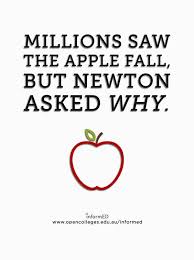Science Inquiry
 The Inquiry Project focuses on the use of academic talk in the science curriculum. How do we get science teachers to value the use of academic discussion, deliberation, and debate when acquiring scientific vocabulary? Schools that integrate language and science instruction can close the science achievement gap for English-language learners, according to a yearlong analysis of six California school districts by the nonprofit Education Trust-West. Among the report’s recommendations are adopting the Next Generation Science Standards and providing regular, engaging language lessons. There is a quality for academic discussions that teachers should take note with the difference between “output” and true interaction. The Oakland Unified School District created a rubric for teachers to assess their own teaching practices, and to see how teachers can grow in the direction of offering better interaction between students in the classroom.
The Inquiry Project focuses on the use of academic talk in the science curriculum. How do we get science teachers to value the use of academic discussion, deliberation, and debate when acquiring scientific vocabulary? Schools that integrate language and science instruction can close the science achievement gap for English-language learners, according to a yearlong analysis of six California school districts by the nonprofit Education Trust-West. Among the report’s recommendations are adopting the Next Generation Science Standards and providing regular, engaging language lessons. There is a quality for academic discussions that teachers should take note with the difference between “output” and true interaction. The Oakland Unified School District created a rubric for teachers to assess their own teaching practices, and to see how teachers can grow in the direction of offering better interaction between students in the classroom.
The Literacy in Learning Exchange offers a webinar for science teachers to begin the process of teaching evidence-based argumentation within the science curriculum. “The presenters share examples of ways to teach students to glean appropriate evidence from informational texts and other resources and methods for compiling and sharing evidence in a cohesive, academic manner in both written and oral formats.” All of my colleagues can benefit from the Seven Ways to Scaffold Instruction for English Learners.
 NPRed recently offered a story titled “English Language Learners: How Your State is Doing” to give more background on the 5 million (and growing) identified English Language Learners in the United States. An undercurrent that is reported is how “gifted” ELLs are not being identified as gifted and talented, and how educators are at-risk of failing to adequately serve this community.
NPRed recently offered a story titled “English Language Learners: How Your State is Doing” to give more background on the 5 million (and growing) identified English Language Learners in the United States. An undercurrent that is reported is how “gifted” ELLs are not being identified as gifted and talented, and how educators are at-risk of failing to adequately serve this community.
Once again, the Teaching Channel offers great insight regarding the importance of teaching language learners the academic discussion techniques. I have pulled directly from Nicole Knight’s blog post:
Why are Academic Discussions So Important for Our ELLs?
Academic discussions help all students develop reasoning skills and deepens understanding of content and multiple perspectives. For ELLs, academic discussions are critical to language and content development because:
- ELLs need the opportunity to hear language in authentic and varied contexts. Teachers, as well as students with higher language proficiency, serve as language models. Particularly important is exposure to discipline-specific language so ELLs hear what it sounds like to communicate in an array of academic contexts.
- ELLs need opportunities to produce language in contextualized and purposeful ways. They need to practice applying form (e.g., grammar, vocabulary) and function (e.g., language used to clarify, explain, argue) to communicate and build ideas.
- ELLs benefit from redundancy of ideas and their related vocabulary. Discussion allows for multiple opportunities to hear new concepts and content explained, analyzed, and interpreted.
How Do We Make Sure Our ELLs are Fully Engaged in and Benefiting from Academic Discussions?
Just because we give students the opportunity to discuss, doesn’t mean they will. We need to provide additional supports and structures so that the students who can benefit the most from academic discussion actually do! Here are five important teaching strategies you can use to support your ELLs to fully participate:
1. Mix up your grouping structures, but give more time to pairs. Whole group discussions provide a great opportunity to model discussion skills, to hear a broad perspective of ideas, and to synthesize learning from small group or pair conversations. The biggest payoff, however, is paired conversations, because they maximize speaking time and increase overall engagement. Even when the structure is a whole-group discussion, consider inserting paired conversations (Turn and Talk or Think-Pair-Share) throughout to allow for ELLs to rehearse their ideas and related academic language.
2. Use discussion strategies that require every student to talk. You can simply open a discussion with a Round Robin, or use Talking Chips or Discussion Cards that allow for equitable participation. Watch students actively participate in discussions in Participation Protocols for Academic Discussions.
3. Provide language support. Providing students access to language resources, such as sentence stems and word banks, gives students both the academic language and confidence to participate. A note of caution: overuse of prescribed sentence starters or stems can actually stifle talk, as students just fill in the blanks. Better yet, have students rehearse a few choice sentence stems and relevant vocabulary before they engage in academic discussion. The goal is for students to know how to access and use language supports when needed and independently (Watch Talk Moves in Academic Discussion).
4. Accept imperfect language. When ELLs are engaged in academic discussion, privilege communication over precision of language. Overcorrection or too much attention to grammatically correct language can hinder ELLs language production and interrupt the flow of ideas. During a discussion, we want our ELLs to approximate correct and sophisticated language, not perfect it.
5. Expect and require extended responses. One of the biggest disservices to our ELLs is to accept one-word or abbreviated responses — even worse is when we complete their sentences. Instead, provide wait time, encourage students to continue, and press students for evidence by asking, “Why?” or, “Can you give me an example?”

Thank you!! This article really gave me some tips. I have been struggling with finding research based strategies that work for some of the ELL students here. Going to make a guide book!!
Hope you are well!
Sent from my iPhone
>
LikeLike
There are excellent strategies to be used, and all linguists agree that output cannot be sacrificed for input in order for acquisition to occur. Unfortunately, all of these strategies do not answer the essential question regarding poverty and how our communities are traumatized, and that schools are not addressing the needs of the children / social-emotional is more important than academic. Finally, some university professors are coming out and writing about this!
LikeLike